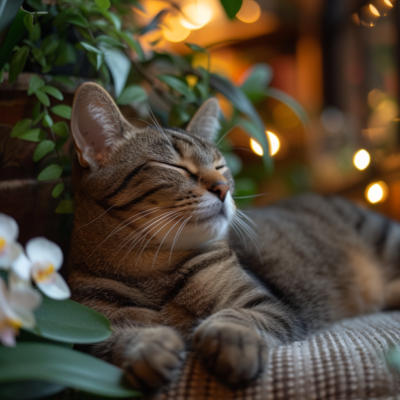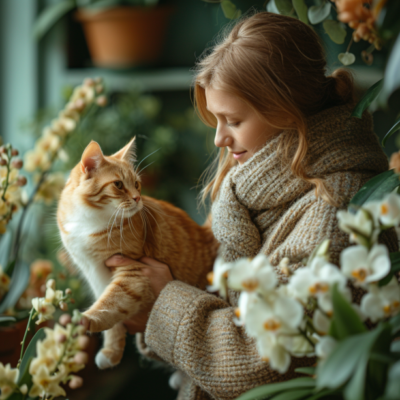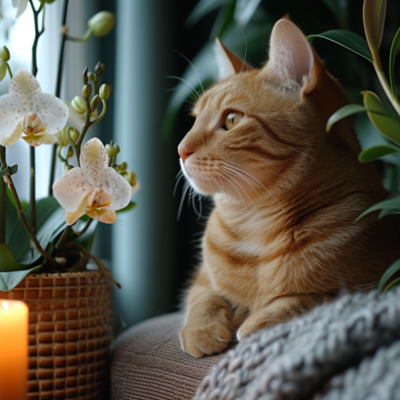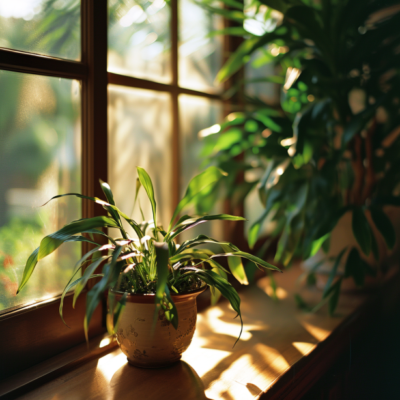According to veterinarian Dr. Sarah, “Some orchids can be toxic to cats if ingested.”
Cat parents, let’s unpack this floral predicament.
That lovely orchid gracing your windowsill may boast enticing soft petals and a sweet nectar within reach of curious felines.
However, certain orchid varieties contain toxic compounds that could sicken a nosy cat.
Fret not, clever reader.
With a bit of research and proper precautions, you can keep both kitty and orchids safe.
This quick guide will identify the risky varieties, explain potential symptoms, and offer solutions…
…to deter your cat and avoid accidental poisoning.
Soon your orchids and cat will coexist in botanical harmony once more.
KEY TAKEAWAY
Are orchids poisonous to cats?
Orchids are generally safe for cats, but cautious measures and knowledge of specific types are crucial.
Orchids and Cat Safety
Most Orchids Aren’t Toxic
Most orchids are actually SAFE for cats and won’t cause any issues if eaten in small amounts. (1)
As an experienced cat owner and plant lover, I’ve found that the…
… common Phalaenopsis orchid, also known as the moth orchid, is…
… one of the most PET FRIENDLY options.
While some misguided folklore suggests all orchids are toxic, the truth is that…
… only a small number can cause mild stomach upset in cats or dogs.
Phalaenopsis orchids, which make up about 90% of home orchid sales, are…
… considered NON-TOXIC to our feline friends.
On the rare occasion a curious kitty nibbles on…
… a phalaenopsis leaf or flower, it’s very unlikely to result in anything more than…
… some VOMITING OR DIARRHEA.
I’ve never had any problems with my two rescue cats getting into my large collection…
… of phalaenopsis orchids over the years.
Individual Sensitivities

It’s important to note that while most orchids are classified…
… as non-toxic or low risk, there can still be INDIVIDUAL SENSITIVITIES.
A cat’s size, health, and other factors like how much they ingest can influence their reaction.
Pups and kittens, as well as cats with pre-existing medical issues…
… MAY EXPERIENCE MORE SEVERE side effects even from generally CAT SAFE plants.
As an expert vet told me, “the dose makes the poison.”
If an orchid is ingested, keep an eye on your furry friend for…
… signs of GASTROINTESTINAL UPSET like vomiting, diarrhea, or loss of appetite.
Most incidents resolve with no treatment needed.
But it’s always best to contact your vet immediately if problems PERSIST OR WORSEN.
Early intervention can prevent more serious poisonings.
Chemicals and Pesticides
While orchid plants are usually safe, you need to be very careful with…
… any sprays or chemicals used to help them grow.
Some products sold for houseplants can make kitties sick even if a tiny bit is licked off.
That’s why as an orchid keeper, I only use natural fertilizers and bug sprays…
… that are certified as safe around pets.
It’s important to read all labels very carefully.
Look for the words “non-toxic” or “child and pet safe” before buying anything.
Some common plant medicines have bad stuff in them that we don’t want curious cats or kids touching.
Only spray orchid treatments on the leaves and flowers when furry friends can’t get to the area.
It’s also good to choose orchid varieties called “cat friendly” to live with.
Phalaenopsis (moth orchids) are a great option since they don’t need medicines very often.
Just make sure to do all treatments when kitties can’t sneak a taste.
With simple safety steps, you can keep your orchids and pets happy at the same time.
Always put your pet’s health first – they depend on us for protection!
Signs of Plant Poisoning in Cats
Gastrointestinal Symptoms
As a veterinary nurse, I often see cats exhibiting DIGESTIVE DISTRESS after chewing on toxic plants.
Two COMMON SYMPTOMS pet parents should watch for include VOMITING AND DIARRHEA. (2)
If your feline FRIEND HAS EATEN plant material, keep an eye out for these signs in the next 6-12 hours.
Continuous retching or stool with blood or mucus means a trip to the veterinarian is necessary.
Some toxic substances can cause damage deeper in the GASTROINTESTINAL TRACT as well.
Signs like LOSS OF APPETITE, abdominal pain, or BLOOD IN THE STOOL…
… indicate more serious poisoning that requires prompt VET ATTENTION.
Cats suffering kidney or liver failure may also display symptoms like…
… increased THIRST, lethargy, or yellowing of gums, eyes, or skin.
ACT QUICKLY and call your vet for guidance if you notice any of these alarming symptoms.
Neurological Symptoms

In severe cases of poisoning, toxins can affect a cat’s NERVOUS SYSTEM and brain functions.
As a PET PARENT, be on alert for ABNORMAL BEHAVIORS that may indicate a toxic exposure.
Things like disorientation, head pressing, seizures, dilated pupils, or erratic movements…
… require EMERGENCY VET CARE.
Delaying treatment for neurological issues can allow the poison to further damage delicate brain tissues and organs.
Contact your vet right away if your cat SEIZES, appears wobbly, confused…
… or lethargic after chewing suspicious plants.
They can identify the toxin through tests and guide an appropriate medical response.
With prompt action, full recoveries are often possible even from severe poisonings.
But the sooner supportive care begins, the better the prognosis.
Signs of Plant Poisoning in Cats
Skin Irritation
As a vet tech, I’ve seen cats with inflammation or redness on their skin after chewinG TOXIC PLANTS.
Their mouths feel an uncomfortable tingle too.
POISON IVY, SPIDER PLANTS, and some FLOWER NECTAR can trigger this response in sensitive kitties.
Watch for signs like pawing at their face, rubbing on furniture, or hair loss/scabs where oral irritation spreads to their fur.
A cat’s skin is highly sensitive.
Contact with caustic plant sap or milky substances may cause reddening, itching, or swelling…
… around their lips, paws and anywhere they groom afterwards.
Seek guidance from your vet or the ASPCA ANIMAL POISON CONTROL hotline right away…
… for advice in managing discomfort until it passes.
Prompt care helps PREVENT DISTRESS.
Other Symptoms
Beyond gastrointestinal and neurological signs, monitor your FELINE FRIEND…
… closely for lethargy, difficulty breathing, increased heart rate, or excessive thirst.
THESE COULD POINT TO TOXIC EFFECTS on other body systems that need evaluation.
Contact your vet for instructions even if symptoms seem minor or resolve quickly.
A toxic substance may still be circulating in their system.
In all cases of potential plant ingestion, it’s wiser to get the all-clear from…
… a medical expert than assume no intervention is needed.
Help is available 24/7 from organizations like the ASPCA or PET POISON HELPLINE.
Safe recovery is the goal, so don’t delay in calling when in doubt about your cat’s well-being.
Their swift guidance and treatment can make all the difference.
Orchid Types and Safety Measures

Phalaenopsis Orchids
As an experienced orchid grower, I can assure folks that Phalaenopsis, also known…
… as MOTH ORCHIDS, pose very little risk to feline family members.
These beautiful FLOWERING PLANTS, which account for…
… around 80% of houseplant orchid sales, are categorized as non-toxic.
Kitties may dislike their subtle scent but the flowers and foliage are…
… HIGHLY UNLIKELY TO CAUSE ANY ISSUES if tasted.
Proper placement out of reach is still recommended as a good idea though.
Orchid Pesticides and Fertilizers
While Phalaenopsis themselves are generally CAT FRIENDLY, it’s crucial to…
… CHOOSE ORCHID CARE PRODUCTS formulated for safety around pets.
Some fertilizers or chemical pest controls can potentially make a furry friend sick…
… if licked from leaves during routine grooming.
I prefer organic sprays and natural fertilizers approved by dog and cat associations for use indoors.
Also KEEP AN EYE on mini containers that kittens find easily swallowed.
Prevention is simplest.
Blue Orchid Dye Concerns
One orchid variety to avoid are dye-JOBS like BLUE ORCHIDS sold around holidays.
These unnatural colors come from food dyes that may pose a digestive risk if enough is consumed.
Play it safe by selecting only traditional colors found in nature.
Or consider other non-toxic floral picks free of artificial substances instead.
Polka dot plants and lemon thyme are two top alternates I’ve gifted friends with felines.
How to Keep Your Cat Safe
Placement Strategies
As a long-time CAT OWNER, I rely on sensible PLACEMENT to protect my feline family…
… from potential plant dangers.
Orchids and other non-toxic species can still be kept out of reach by display on…
… HIGH SHELVES or with anchoring to table tops using heavy pots.
I securehanging plants well above scratching level too.
Some furry friends may leap impressive heights, so play it safe!
Training Your Cat

Teaching your curious kitty which plants are off-limits takes some time…
… but it’s totally possible with the right approach.
If you catch Fluffy smelling your orchids, gently clap your hands or say “ah-ah!” in a soft voice.
This interrupts the unwanted behavior.
Then give them a treat when they look at you instead.
You want them to understand sniffing plants isn’t a fun time.
It’s also great to have a fun toy ready to redirect their energy.
As soon as they pay attention to you, calmly say “good kitty!” and let them play…
… with a feather wand or fuzzy mouse.
Make sure play time is super rewarding.
Being consistent is key – don’t forget to praise good choices with treats and cuddles.
You can even grow your own cat grass so they know one plant is okay to chew.
Watching them happily munch green blades shows them alternatives to your pretty flowers.
With practice, they’ll learn to leave orchids alone.
And it’s okay if mistakes happen – stay calming and keep redirecting.
With your love and guidance, even young kitties will understand houseplant rules.
Recognizing Toxic Plants
Expand your education beyond just orchids.
Other common houseplants like lilies, peace lilies, and philodendron can pose…
… serious threats to pets if ingested.
I share plant safety information freely to spread helpful awareness.
The ASPCA maintains online guides with “safe” and “toxic” lists.
Consulting experts empowers choices protecting entire families, including furry ones!
Knowledge is power when living with pets indoors.
Frequently Asked Questions
Are all parts of the orchid plant safe for cats?
While the leaves and flowers of phalaenopsis orchids are generally…
… considered non-toxic, it’s best to keep curious kitties away from consuming large quantities…
… of orchid roots, pseudobulbs, potting medium or bark.
These plant parts are not terribly harmful but could potentially cause mild gastrointestinal upset if eaten.
Prevention is simplest by keeping orchids out of reach.
What if my cat chews an orchid – should I induce vomiting?
No, inducing vomiting is not recommended if a cat chews on an orchid.
Orchids are low risk plants and vomiting could potentially cause more harm than good.
Watch your pet closely for signs of distress and contact your vet…
… or animal poison control right away if any concerning symptoms develop.
In most cases, no treatment is needed.
Can kittens be more sensitive to orchids than adult cats?
Potentially yes, since kittens are smaller and still developing.
Their immune systems may not be as strong, so a minor toxin could affect…
… them more easily than full grown cats.
It’s best to keep all houseplants well out of reach and chewing range of kittens to…
… prevent any possible exposure.
Supervise playtime and consider cat-proofing rooms with curious youngsters.
What’s the best way to deter cats from chewing houseplants?
Positive reinforcement training works best by rewarding cats for leaving plants alone…
… and redirecting to approved chewing toys.
You can also try adhesive animal deterrents, double sided sticky tape, or aluminum foil around pots short term.
Consistent interruptions combined with providing acceptable alternatives like…
… cat grass helps cats understand houseplants are off limits for chewing over time.
Conclusion
In closing, the GOOD NEWS is that most commonly grown orchid varieties…
… pose very little threat to our feline friends and companions when kept properly.
While individual sensitivities exist, overall the overwhelming research indicates…
… that Phalaenopsis orchids like MOTH ORCHIDS are generally SAFE for dogs and cats.
With some basic precautions involving placement, training, and chemical controls, orchid plants…
… can coexist happily with cat-friendly households.
Always contact your vet or a pet poison hotline immediately if any signs of illness arise…
… after a possible exposure to any plant material – but try not to panic.
More often than not, minor incidents cause no harm.
With care and monitoring, orchids prove a beautifully low-risk way to nurture both…
… your love of greenery AND furry family members.
Leave me a comment below if you have any other questions!
References
- https://www.thespruce.com/are-orchids-toxic-to-cats-7255609
- https://www.thehealthypetclub.co.uk/plant-poisoning-in-cats/
Related Articles
- https://knowngarden.com/are-succulents-safe-for-cats-and-dogs/
- https://knowngarden.com/is-snake-plant-toxic-to-pets/
- https://knowngarden.com/love-plants-but-no-sunlight-these-plants-can-be-your-best-buddy/




